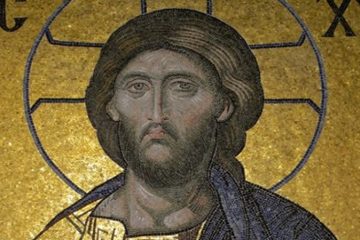Anonymous
Every Friday during Great Lent, crowds of the faithful flock to churches to honor the Mother of God, to sing ‘Hail’ to the ‘sweetly-smelling incense’, the ‘precious myrrh’, Our Lady. Orthodox churches are redolent with the ineffable fragrance exuded by the pure figure of the most blessed Mother of God.
This is why the faithful, together with the hymnographer sing aloud: ‘Hail, scent of Christ’s fragrance’. The fragrance of Christ! This is the exquisite, sublime aroma exuded by the Virgin Mary. In a world that was choking on the stench of sin, in an atmosphere that was suffocating with the fumes of moral decay and religious delusion, the Mother of God became the ‘august tabernacle of the fragrance,’ the vessel of Grace filled with the inexhaustible myrrh of the divinity. But what was it that made the Virgin Mary a suitable vessel to bring the fragrance of Christ into the world?
First of all, the purity of her soul. Throughout her life, the Most Holy Virgin was unsullied and unblemished. From her earliest age she kept her soul clean and pure. She lived for years in Nazareth, but did not allow its polluted and wretched surroundings to contaminate her moral purity to the slightest degree. With God’s grace, she withstood the attacks of the enemy, the devil, and remained untouched and unaffected.
Our Lady was a shining white lily of purity. She was the only blossom that sinful humanity had as an offering to be overshadowed by the Holy Spirit and to receive the heavenly myrrh, Jesus Christ. Saint Basil the Great says that in that generation of people there was no-one of equal purity to Mary who could have received the energy of the Holy Spirit (PG 31, 1464 BC). The Mother of God’s clean and pure life made her a vessel worthy of hosting Christ, the aroma more exquisite than any other fragrance.
Apart from the purity of her soul, the Virgin Mary took care to cultivate the uniquely beautiful divine virtues. How can we not be awed by the humility and obedience of the all-pure Maiden when she says: ‘Behold the handmaid of the Lord; may it be unto me according to your word’. (Luke, 1, 38). How can we not praise the piety, the love and devotion to God of the girl who lived from an early age within the Temple of the Lord?
How can we not express our admiration for her trust in the words of the Archangel Gabriel which were so antithetical to human reason. And, again, how much we might say about her prudence, her modesty…
When we study the life of the Mother of God, a boundless world of virtue is revealed to us, which is why the holy hymnographers call her call her ‘the garden of the graces’ and ‘paradise’, in which flourished all the colorful and sweet-smelling blossoms of the virtues.
So, in a world which was suffering in the stifling atmosphere of wickedness, only the Virgin Mary could have blossomed and exuded the aroma of the most fragrant and heavenly virtue. This is why, in the fullness of time, our all-good God chose her to be the mother of His incarnate Son and Word. And then Our Lady was filled with the fragrance of Christ. Through the divine self-emptying, the whole of the inexhaustible myrrh filled Mary’s being. The ‘most pure vessel’ who was fragrant because of her holy life, now held within her walls, in a manner past understanding, the source of this fragrance, Our Lord, Jesus Christ.
The mystery of the incarnation of the Word of God showed Our Most Holy Lady to be the most ‘precious myrrh’, the ‘scent of Christ’s fragrance’. Since then, the Mother of God, Our Lady has exuded this divine fragrance as a unique scent of myrrh. She draws people to Our Lord Jesus Christ, to redemption and salvation.
‘Hail, scent of Christ’s fragrance. We, too, smell and enjoy the scent of Christ’s fragrance, together with Our Most Holy Lady, with the saints, with the Lord Jesus. It’s a spiritual fragrance which God often permits us to feel through our senses, when we venerate icons which produce myrrh or the grace-filled holy relics of the saints which are sweet-smelling. This scent of the fragrance of Christ can also be given off by our own life, since Saint Paul says: ‘We are the pleasing aroma of Christ’ (2 Cor. 2, 15). This is provided we take care to ensure that we keep our soul free of the passions and sins and that we adorn it with the flowers of the virtues. Let us imitate here, too, the example of the all-pure Maiden of Nazareth. Times today are no worse than they were then. Through her intercessions, each of us can be like her: in purity, in faith, in humble obedience to the will of God. Such virtues attract the Grace of God and inject life-giving, fragrant air into the asphyxiating atmosphere in which we live.
But our life will bear the ‘fragrance of Christ’ to a much greater extent when we welcome into ourselves the most fragrant myrrh, Christ the King. That is to say when, after preparation and with a pure heart, we approach the heavenly sacrament of Holy Communion. Then we, the faithful, united with the Lord Jesus become the fragrance of Christ ourselves.
Let us entreat Our Most Holy Lady the Mother of God to enable each of us, through a pure and virtuous life and through participation in the divine sacraments of the Church, to become a censer of Christ, filling our surroundings with the aroma of faith, the ‘scent of the fragrance of Christ.
Source: pemptousia.com




0 Comments